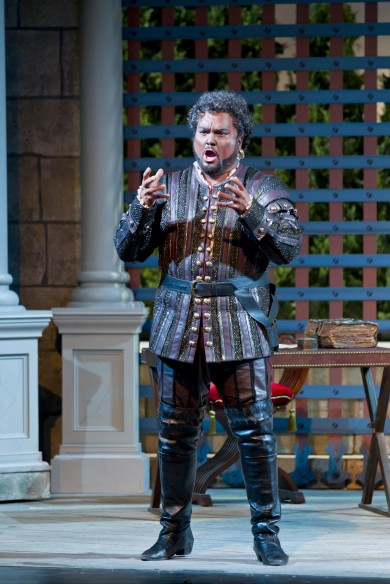Tenor Davila brings electrifying intensity to Sarasota Opera’s “Otello”

Rafael Davila in the title role of Sarasota Opera's "Otello." Photo: Rod Millington
At long last, Otello.
It’s taken 23 years for Sarasota Opera’s Verdi cycle to finally reach the composer’s late masterwork. Part of the problem was logistical—until the company’s theater renovation was completed in 2008, the tiny orchestra pit was too small to hold the large forces required for Verdi’s ambitious score.
Expecations were high, considering the scale and commitment of this long-running Verdi project and the time it’s taken artistic director Victor DeRenzi to get to the composer’s setting of Shakespeare’s tale of the Moorish general driven to murder by his crazed jealousy for his innocent wife Desdemona. Heard Saturday night Sarasota Opera’s Otello proved mostly successful and worth the wait, due in large part to an overpowering performance by Rafael Davila in the title role.
Davila has been Sarasota’s go-to house tenor for the last several seasons for Italian and French repertory. Over that span, the Puerto Rican singer has grown from a promising journeyman to an artist of real stature. His imposing instrument has become even larger in volume and heft and, as an actor, Davila has vastly improved since his first Sarasota seasons.
Not everything was perfect in Davila’s debut assumption of the haunted Moor. He seemed to take a while to warm up Saturday, passed on some crucial top notes and his soft singing in the duet and elsewhere was not always steady or under control.
Yet the tenor brought such command and cumulative dramatic intensity to the unraveling Moor that all doubts were swept aside. His victorious entrance and rich-voiced Esultate! were clarion and forceful. The Act 1 love duet was less inspired but as the evening unfolded, and Otello’s jealousy spins out of control under the calculating Iago, Davila’s performance become electrifying.
He brought full-metal vocalism to the Oath Duet and alarming intensity to his scenes with Desdemona as his suspicions mount of her unfaithfulness. After murdering his innocent wife, the Moor’s remorse and devastation were fully manifest in Davila’s broken and devastated Niun mi tema. Davila has been around for a while now, but this is truly a breakout performance that should take the gifted tenor’s career to the next level.
Sean Anderson was an equally inspired Iago. The American baritone’s timbre is robust though not very Italianate and thins out markedly at the top, sounding a bit slender next to Davila’s vast tone.
Still, Anderson sang well and expressively throughout. Si, pel ciel with Davila was riveting in its resounding impact and Anderson also brought an elegant malevolence to Iago’s cynical Credo. Dramatically, Anderson completely embodied the evil, manipulating Iago, often standing still on stage, his hands piously folded, a portrait of mock-angelic moral hypocrisy.
The wild card in the cast was Maria D’Amato, who proved a serviceable rather than inspired Desdemona. The singer’s voice sounded at least one size too small for the role, constricted in amplitude and failing to expand in climaxes. Her rather hard timbre also lacked an essential purity and radiance. Her Willow Song was literal and far too fast with little feeling or empathy. D’Amato floated a lovely pianissimo on the Amen, but, otherwise, her Ave Maria was similarly cool. Even more pointedly, D’Amato is a medicore actress and this searing drama requires far more fire and intensity than she was able to bring to the role of the doomed Desdemona.
Cynthia Hanna was a fine Emilia, Heath Huberg, a capable Cassio.
David P. Gordon supplied his usual evocative traditional sets, once again beautifully lit by Ken Yunker, with Stephanie Sundine contributing fluid and natural stage direction.
Victor DeRenzi, one of our finest Verdians, whipped up a cataclysmic frenzy in the opening storm scene, Throughout his idiomatic direction was as alive to the intimate moments as the mounting drama with the impending tragedy of the final scene ratcheted up to a nerve-wracking degree.
The choral singing under the direction of Roger L. Bingaman was the finest I’ve heard in ten years of attending Sarasota performances with a polish, weight and full-blooded richness belying its relatively small numbers.
Otello will be repeated 8 p.m. March 22 and 1:30 p.m. March 25. sarasotaopera.org